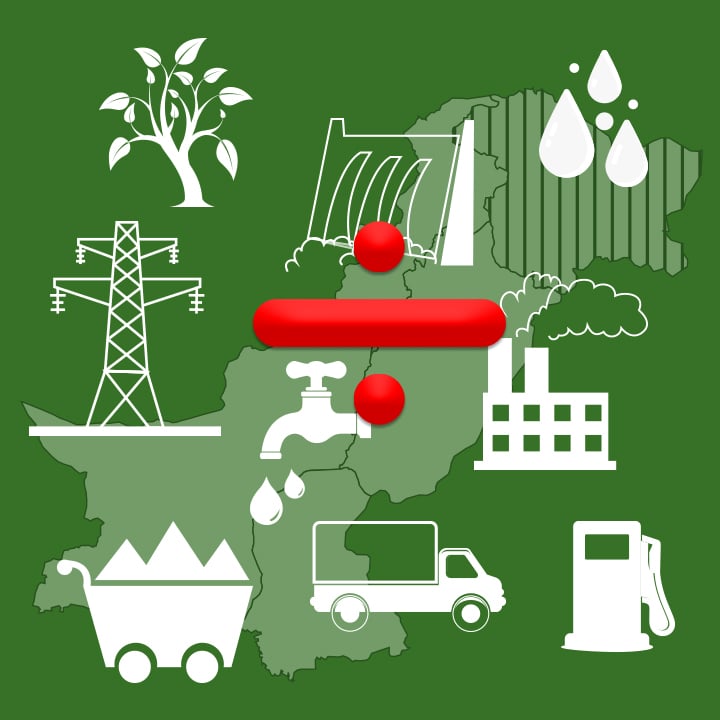The deep divide between the center and the provinces became all too apparent in the recently-held first meeting of the 10th National Finance Commission (NFC). The provincial government of Sindh, for instance, took exception to the federal government’s suggestion that the provinces allow a deduction from their share of the national revenue in order to provide development funds for the former tribal areas now merged in Khyber Pakhtunkhwa.
Sindh’s Chief Minister Murad Ali Shah told the meeting that his province would not give up its share under any circumstances. He also complained that the federation, in fact, had already deducted 80 billion rupees from Sindh's share during the ongoing financial year. This, he said, was having a severely negative effect on the province’s financial affairs.
Representing Khyber Pakhtunkhwa, its finance minister Taimur Khan Jhagra stressed the need for investing in the development of tribal areas because, he said, five million people living there were severely affected by the war on terror over the last 20 years. Speaking in the same vein, Balochistan argued that its share be increased since it had spent 250 billion rupees from its financial resources to ward off terrorism. Its representative said the center and the rest of the provinces should play their part in addressing its economic deprivation.
Former senator, political activist and former head of the Human Rights Commission of Pakistan, Afrasiab Khattak, comments on this situation by saying: “The two constitutionally-mandated NFC awards have not come about after 2010 and, in the meanwhile, the federal government has been cutting back the financial resources made available to the provinces under the 9th NFC award.” This, he says, makes the provinces feel that the federal government wants to deprive them of their legitimate share in financial resources.
Prominent economist and Balochistan’s technical representative in NFC, Dr Kaiser Bengali, argues that the way out of the impasse that 10th NFC award is facing is not that the federal government reduces the share of the provinces. “It should, instead, cut its own expenses,” he says.
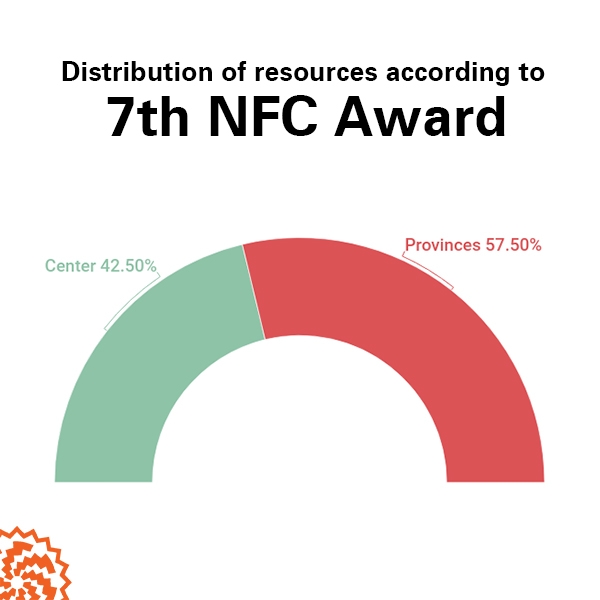
After the passage of the 18th constitutional amendment, Bengali says, the federal government should have abolished many of its departments and handed them over to the provinces. This would have reduced its expenses, he remarks and points out that the federal government, instead, has only changed the names of those departments and kept them intact. “Since the federal government has not brought down its spending, it is now thinking of reducing the share of the provinces in the national finances in order to overcome its own deficits.”
Such differences between the center and the provinces over the distribution of financial resources are nothing new. They started immediately after Pakistan came into being. Conflicts between East Pakistan and West Pakistan over national language, division of executive authority , nature of parliamentary representation and resource allocation became salient at the very outset and eventually led to the division of the country 25 years later.
Over the last 50 years, however, there have been some serious attempts to address these issues. The 1973 Constitution and the 18th constitutional amendment are among the most successful of these attempts.
But these steps notwithstanding, serious differences persist between the central and the provincial governments – as well as among the provinces -- over the distribution of financial and natural resources.
A look back
The Lahore Resolution of 1940, now called the Pakistan Resolution and also considered the basis for the establishment of Pakistan, delineated the relationship between the center and the provinces very clearly. It stated: ‘’the provinces would be independent in running their affairs”.
The final point of this resolution said “the working committee of this meeting will formulate a constitution-drafting plan for [the British India’s] national defense, foreign affairs, communications, customs and other necessary matters in accordance with the basic principles of the resolution”. This suggests quite unambiguously that the provinces will have control over the rest of the subjects.
Earlier, in March 1929, Quaid-e-Azam Muhammad Ali Jinnah presented his famous 14 points in response to the Nehru Report which had suggested a strong central government. Jinnah, on the other hand, called for an equal measure of autonomy for all the provinces of British India. Similarly, in 1946, Jinnah accepted the British cabinet mission’s plan for India's independence which stated that “all powers except foreign affairs, defense and communications would be vested in the provinces’’.
Bengali points out that this principle has been violated since the beginning of Pakistan’s history. For example, he says, the provincial governments had the power to levy sales tax when Pakistan came into being but soon afterwards Prime Minister Liaquat Ali Khan temporarily handed it over to the center due to the state of economic emergency that the new state was in. “Today, 72 years later, sales tax is still in the hands of the center.”
When it comes to devolving power to the provinces, control over financial and natural resources is especially important because provincial autonomy is a hollow slogan without financial autonomy. After independence from the British rule, Pakistan had a clear opportunity to ensure this.
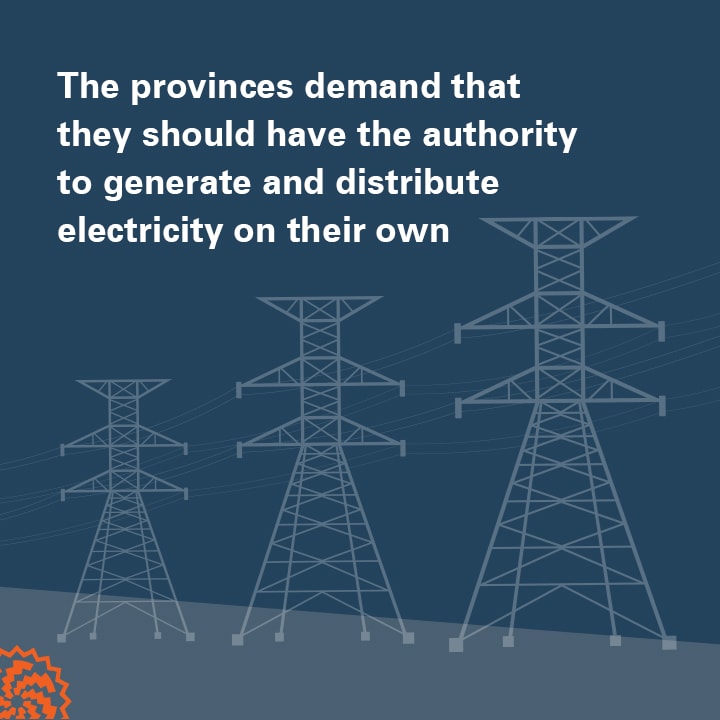
According to Bengali, the partition of the subcontinent resulted in the emergence of a strong central government in India which later formed the provinces. Pakistan, on the other hand, did not have a central government, he says. “It came into being through powers taken from the provinces.”
He, therefore, argues that “it is necessary to return those powers to the provinces and give them a fair share in national resources in order to alleviate the sense of deprivation among them”.
The NFC awards
In 1947, Liaquat Ali Khan asked a government official, Jeremy Raisman, to work out a mechanism for the distribution of revenue between the central and the provincial governments so that the economic differences between the center and the provinces could be brought to an end. Raisman devised a formula in 1952. Called Raisman Award, it gave 50 percent of the sales tax collected from the provinces to the central government. The two subsequent financial awards, in 1961 and 1964, distributed the revenue between East and West Pakistan also on the basis of the Raisman formula.
The 1973 Constitution gave the National Finance Commission a permanent status. Its article 160 states that a new National Finance Commission must be formed every five years to approve the distribution of financial resources among the federal units.
Originally under this arrangement, the distribution of financial resources was done in proportion to the population of the provinces. Punjab, thus, always took the largest share. Consequently, the smaller provinces would object to its share as being unfairly large and oppose the distribution of resources entirely on the basis of population.
Their concerns were addressed, at least partially, in 2010 when 9th NFC award reduced the center’s share in the divisible resources to 42.5 percent and increased the joint share of the provinces to 57.5 percent. The award also devised a detailed formula which included various economic and social indicators along with population as the basis of resource distribution. It divided 82 percent of the provincial share on the basis of population, 10.3 percent on the basis of poverty, five percent on the basis of tax and revenue collection and 2.7 percent on the basis of land area.
“Poverty, marginalization, productivity and geography have also been made the basis of resource allocation to alleviate the sense of deprivation among small provinces,” says Khattak. He, however, adds this, too, is not enough because 82 percent of the financial resources are still being divided on the basis of population alone.
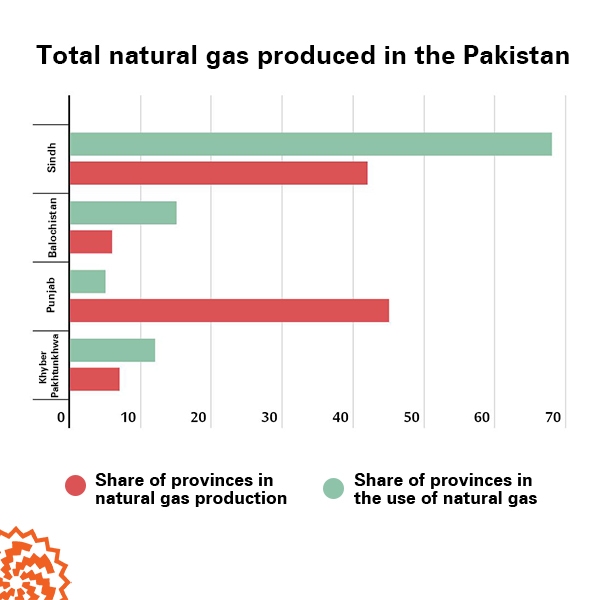
While these older issues are yet to be resolved, some new ones have arisen with the formation of the latest NFC. Last year, for example, Sindh objected to the appointment of the commission’s members. It said the constitution entitles the president to appoint the members but only after consulting the provincial governors and chief ministers. While appointing the members of the current commission, Sindh alleged, the president did not seek the opinion of the provincial governments.
The government of Balochistan, similarly, contended that the battlefield against terrorism has shifted from Khyber Pakhtunkhwa to Balochistan. So, its share in the divisible financial resources should be increased.
The federal government, on the other hand, introduced a resolution in the Senate to reduce the share of provinces. The resolution, though, did not pass because the representatives of all the four provinces expressed great concern over its contents. They called it an attempt to strip the provinces of their rights.
Rsource cursee
The provinces also have serious objections to the distribution of water among them. Sindh has not yet endorsed the water sharing accord signed in 1991. It only abides by the majority’s decision in the accord – after having added its own note of dissent to it.
Even under this accord, Sindh wants water distributed in accordance with its paragraph 2 which reduces Punjab’s share by 4-5 million acre feet. Punjab, however, insists that water distribution be done under paragraph 14 which gives it more water for irrigation than the other provinces.
The proposed construction of the Kala Bagh Dam on the Indus River, similarly, has been a divisive issue among the provinces for more than three decades. Sindh and Khyber Pakhtunkhwa oppose its construction, alleging that it will benefit only Punjab while subjecting them to floods and droughts.
The provinces also have many objections to the electricity distribution system. They demand that they should have the authority to generate and distribute electricity on their own.
Khyber Pakhtunkhwa, in particular, is of the view that the formula for the distribution of electricity should take into account the origin of electricity generation so that smaller provinces where electricity is generated do not face its shortage. Since more electricity is generated in Khyber Pakhtunkhwa than it can use so there is no justification for load-shedding in it, the provincial government contends.
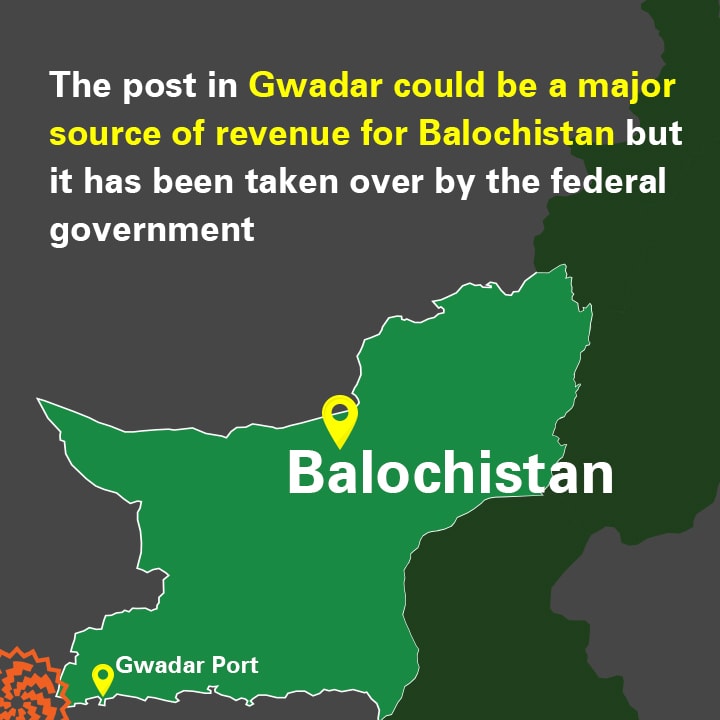
Khattak believes the federal government has long suppressed the right of Khyber Pakhtunkhwa on this issue. “In 1991, it was decided according to AGN Qazi formula that Khyber Pakhtunkhwa will receive an annual profit of six billion rupees on the electricity generated in it but this formula was never implemented,” he says. “Other than during the last federal government of the Pakistan People’s Party (2008-13), the center has never paid this amount.”
Sindh, similarly, demands that it should have the authority to sell the electricity being generated from a 660 megawatt coal-fired power plant in Thar. The center doesn’t deign to listen.
According to Khattak, Balochistan, too, has serious grievances about how the natural gas extracted from it has been used for running industries and heating homes elsewhere in the country. The province itself was last to get the gas.
Even today natural gas distribution remains heavily skewed in favor of Punjab. Its share in total gas production in the country is only five percent but it uses 45 percent of it. Contrarily, Sindh produces 68 percent natural gas but uses 42 percent. Both Khyber Pakhtunkhwa and Balochistan, which produce 12 percent and 15 percent of gas respectively, use only seven percent and six percent of it.
Sindh is of the view that article 158 of the constitution, as revised under the 18th amendment, gives every province the right to use its natural resources for meeting its own needs before allowing other provinces to use them. On the same bases, it complains that it produces more gas than it uses but it still experiences gas rationing for industries and CNG stations.
Also Read

Broadsheet case: How much money Pakistan has lost in a 20-year saga of inefficiency and mismanagement
The central government, however, says that Pakistan’s resources belong to all the citizens of the country regardless of which province they live in. That is why, it argues, natural gas – or any other resources -- produced in one province should be provided to every part of the country equitably.
Most people in Balochistan contend that this principle should not be extended to land. Many of its political parties and parliamentarians, therefore, oppose the federal authority over Gwadar port which is being built with China’s help. They demand the port and the revenue generated from it should belong to Balochistan and all the domestic and foreign agreements made in this regard should be brought to Parliament.
“Balochistan has a major source of revenue in the form of Gwadar port but it has been taken over by the federal government,” says Jahanzeb Jamaldini, a senator belonging the Balochistan National Party (BNP). He also alleges that the projects being built under the China-Pakistan Economic Corridor (CPEC) benefit Punjab more than they benefit other provinces. Balochistan and Khyber Pakhtunkhwa, according to him, are benefiting the least from CPEC. “The promises made to Balochistan regarding the western route of CPEC have not been fulfilled. Such things weaken the federation,” he says.
Sindh, too, complains that it has never been informed about the projects to be carried out in small provinces under CPEC. Although the rehabilitation of Keti Bandar and Karachi Circular Railway have been made a part of CPEC after vociferous protests by the provincial government, the central government has not include wind and coal power projects in CPEC in spite of the fact that Sindh offers huge opportunities for investment in these two sources of energy.
The latest controversy to erupt over center-provinces relations was triggered by an ordinance issued by the central government last year. Called the Pakistan Island Authority, it aimed at bringing 10 islands off the coast of Sindh and Balochistan under the federal jurisdiction. Two of these islands are located in Sindh while eight are in Balochistan.
Strongly opposing this ordinance, Sindh took the position that these islands constitutionally belong to the provinces and every decision about them, including their development, is the prerogative of provincial governments. Although the federal government withdrew development orders for two islands off the coast of Karachi after Sindh's protests, the province’s concerns have not been totally allayed yet.
This report was first published by Lok Sujag on 29 Mar 2021, on its old website.
Published on 7 Jun 2022
